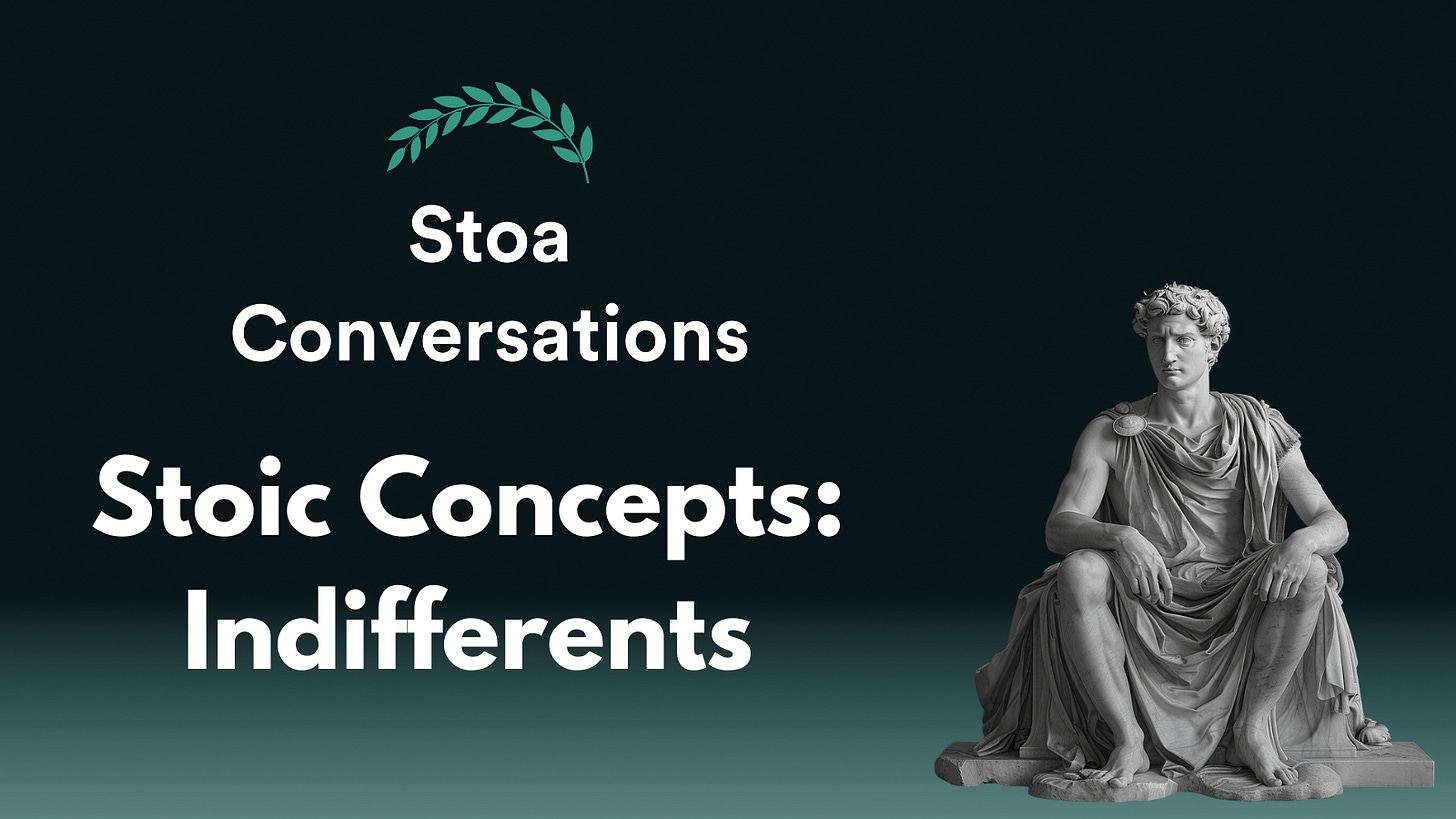Indifferents
Essential Stoic concepts
Welcome to The Stoa Letter, the newsletter on Stoic theory and practice.
🏛️ Theory
A central Stoic concept is indifferents. To understand it, it’s essential to understand Stoic views on the good.
The good is what provides the guiding north star to our lives. When we see it, we’re motivated to follow it. The Stoics were not just looking for something sometimes good – they were seeking the unconditionally good. For this reason, they settle on virtue. No matter the situation, acting with virtue is good.
Now, indifferents are things that are conditionally good. Sometimes they are worth pursuing, but often they are not. The ancient biographer Diogenes Laërtius describes the Stoic view:
The Stoics say that some existing things are good, others are bad, and others are neither of these… Everything which neither does benefit nor harms is neither of these: for instance, life, health, pleasure, beauty, strength, wealth, reputation, noble birth, and their opposites, death, disease, pain, ugliness, etc….
Diogenes Laërtius
What matters is how we use these things. For example, in general, health is worth promoting. But we wouldn’t want to choose health over everything. A long life isn’t necessarily a good one.
The Stoics divided indifferents between preferred and dispreferred indifferents. Preferred indifferents are suitable to our nature, so they’re often worth pursuing. Dispreferred indifferents, like pain, are not. So we should typically avoid them. But they are not bad in and of themselves. Often, we should choose them.
As the Stoics were fond of saying:
It is not things in themselves that harm us, but our opinion of them.
We could also say:
It is not things in themselves that benefit us, but how we use them.
What’s ultimately bad is vice and what’s ultimately good is virtue.
Think about a game or competition. What’s good is being an excellent player and doing your best to win. That’s the ultimate goal. Every game will have techniques that are typically good things to do, but most games, especially complicated and sophisticated ones, do not have strategies that work 100% of the time. They are preferred, but not always good.
The technique and strategy you choose depend on the circumstances, your opponent, and who you are. How you deploy your chosen techniques and stratagems will determine how good of a player you are.
In life, virtue provides that ultimate goal. How you use indifferents is what makes you virtuous. The indifferents are the “material” for virtue.
There’s a central confusion here that one sometimes sees. The fact that something is indifferent doesn’t mean you shouldn’t care about it. Likewise, just because things like reputation or other people’s behavior are indifferent doesn’t mean they are irrelevant. What we’re each called to do is respond to things well. Often, caring and responding to other people with conviction is the right path forward.
Action
Identify an indifferent in your life to use well today.
🎯 Action
Identify an indifferent in your life to use well today.
🔗 Links
🎧️ Learn more about indifferents with Michael and I in our most recent discussion here:

Essential Stoic Concepts: Indifferents (Episode 136)
Ancient philosophy for modern life
stoameditation.com/blog/essential-stoic-concepts-indifferents-episode-136

🎧️ I tried something new in last weeks podcast, reading from my essay Why Stoicism Is True. Check it out here and let me know what you think.

Why Stoicism Is True (Episode 136)
A defense of the ancient Greco-Roman philosophy
stoameditation.com/blog/why-stoicism-is-true-episode-136

🎂 I collected 31 quotes for my 31st birthday from my readings. Inspiring, provocative, and amusing. If you have any special quotes to share, let me know.

Quotes on ordinary life, ancient philosophy, and Stoicism
calebontiveros.substack.com/p/31-quotes-for-31

What did you think about today's letter?
🏆️ Share The Stoa Letter
If you find what we’re doing useful, please share it. Just have people sign up with your link below.
Share The Stoa Letter
{{rp_personalized_text}}
Or copy and paste this link to others: {{rp_refer_url_no_params}}
Get hundreds of Stoic meditations and lessons with the Stoa app (free download)

